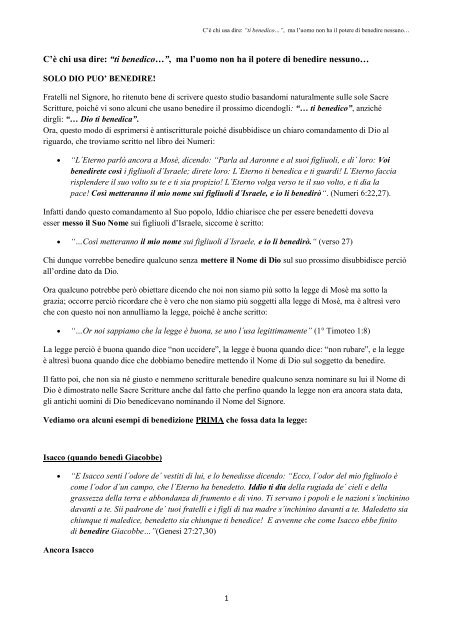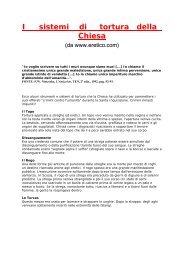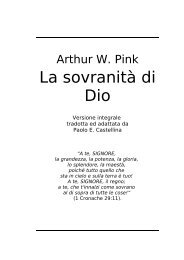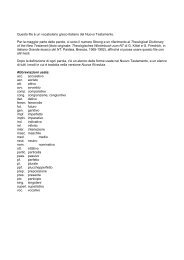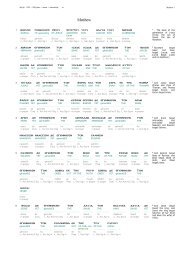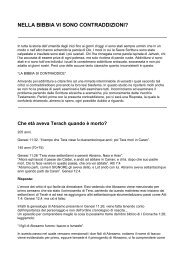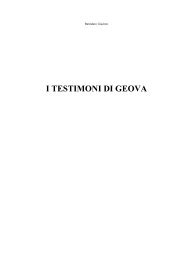C'è chi usa dire: “ti benedico…”, ma l'uomo non ha il potere di ...
C'è chi usa dire: “ti benedico…”, ma l'uomo non ha il potere di ...
C'è chi usa dire: “ti benedico…”, ma l'uomo non ha il potere di ...
You also want an ePaper? Increase the reach of your titles
YUMPU automatically turns print PDFs into web optimized ePapers that Google loves.
C’è <strong>chi</strong> <strong>usa</strong> <strong><strong>di</strong>re</strong>: <strong>“ti</strong> <strong>bene<strong>di</strong>co…”</strong>, <strong>ma</strong> l’uomo <strong>non</strong> <strong>ha</strong> <strong>il</strong> <strong>potere</strong> <strong>di</strong> bene<strong><strong>di</strong>re</strong> nessuno…<br />
C’è <strong>chi</strong> <strong>usa</strong> <strong><strong>di</strong>re</strong>: <strong>“ti</strong> <strong>bene<strong>di</strong>co…”</strong>, <strong>ma</strong> l’uomo <strong>non</strong> <strong>ha</strong> <strong>il</strong> <strong>potere</strong> <strong>di</strong> bene<strong><strong>di</strong>re</strong> nessuno…<br />
SOLO DIO PUO’ BENEDIRE!<br />
Fratelli nel Signore, ho ritenuto bene <strong>di</strong> scrivere questo stu<strong>di</strong>o basandomi naturalmente sulle sole Sacre<br />
Scritture, poiché vi sono alcuni che <strong>usa</strong>no bene<strong><strong>di</strong>re</strong> <strong>il</strong> prossimo <strong>di</strong>cendogli: “… ti bene<strong>di</strong>co”, anziché<br />
<strong>di</strong>rgli: “… Dio ti bene<strong>di</strong>ca”.<br />
Ora, questo modo <strong>di</strong> esprimersi è antiscritturale poiché <strong>di</strong>subbi<strong>di</strong>sce un <strong>chi</strong>aro co<strong>ma</strong>ndamento <strong>di</strong> Dio al<br />
riguardo, che troviamo scritto nel libro dei Numeri:<br />
“L´Eterno parlò ancora a Mosè, <strong>di</strong>cendo: “Parla ad Aaronne e al suoi figliuoli, e <strong>di</strong>´ loro: Voi<br />
bene<strong><strong>di</strong>re</strong>te così i figliuoli d´Israele; <strong><strong>di</strong>re</strong>te loro: L´Eterno ti bene<strong>di</strong>ca e ti guar<strong>di</strong>! L´Eterno faccia<br />
risplendere <strong>il</strong> suo volto su te e ti sia propizio! L´Eterno volga verso te <strong>il</strong> suo volto, e ti <strong>di</strong>a la<br />
pace! Così metteranno <strong>il</strong> mio nome sui figliuoli d´Israele, e io li bene<strong>di</strong>rò“. (Numeri 6:22,27).<br />
Infatti dando questo co<strong>ma</strong>ndamento al Suo popolo, Id<strong>di</strong>o <strong>chi</strong>arisce che per essere benedetti doveva<br />
esser messo <strong>il</strong> Suo Nome sui figliuoli d’Israele, siccome è scritto:<br />
“…Così metteranno <strong>il</strong> mio nome sui figliuoli d´Israele, e io li bene<strong>di</strong>rò.“ (verso 27)<br />
Chi dunque vorrebbe bene<strong><strong>di</strong>re</strong> qualcuno senza mettere <strong>il</strong> Nome <strong>di</strong> Dio sul suo prossimo <strong>di</strong>subbi<strong>di</strong>sce perciò<br />
all’or<strong>di</strong>ne dato da Dio.<br />
Ora qualcuno potrebbe però obiettare <strong>di</strong>cendo che noi <strong>non</strong> siamo più sotto la legge <strong>di</strong> Mosè <strong>ma</strong> sotto la<br />
grazia; occorre perciò ricordare che è vero che <strong>non</strong> siamo più soggetti alla legge <strong>di</strong> Mosè, <strong>ma</strong> è altresì vero<br />
che con questo noi <strong>non</strong> annulliamo la legge, poiché è anche scritto:<br />
“…Or noi sappiamo che la legge è buona, se uno l´<strong>usa</strong> legitti<strong>ma</strong>mente” (1° Timoteo 1:8)<br />
La legge perciò è buona quando <strong>di</strong>ce “<strong>non</strong> uccidere”, la legge è buona quando <strong>di</strong>ce: “<strong>non</strong> rubare”, e la legge<br />
è altresì buona quando <strong>di</strong>ce che dobbiamo bene<strong><strong>di</strong>re</strong> mettendo <strong>il</strong> Nome <strong>di</strong> Dio sul soggetto da bene<strong><strong>di</strong>re</strong>.<br />
Il fatto poi, che <strong>non</strong> sia né giusto e nemmeno scritturale bene<strong><strong>di</strong>re</strong> qualcuno senza nominare su lui <strong>il</strong> Nome <strong>di</strong><br />
Dio è <strong>di</strong>mostrato nelle Sacre Scritture anche dal fatto che perfino quando la legge <strong>non</strong> era ancora stata data,<br />
gli anti<strong>chi</strong> uomini <strong>di</strong> Dio bene<strong>di</strong>cevano nominando <strong>il</strong> Nome del Signore.<br />
Ve<strong>di</strong>amo ora alcuni esempi <strong>di</strong> bene<strong>di</strong>zione PRIMA che fossa data la legge:<br />
Isacco (quando benedì Giacobbe)<br />
“E Isacco senti l´odore de´ vestiti <strong>di</strong> lui, e lo bene<strong>di</strong>sse <strong>di</strong>cendo: “Ecco, l´odor del mio figliuolo è<br />
come l´odor d´un campo, che l´Eterno <strong>ha</strong> benedetto. Id<strong>di</strong>o ti <strong>di</strong>a della rugiada de´ cieli e della<br />
grassezza della terra e abbondanza <strong>di</strong> frumento e <strong>di</strong> vino. Ti servano i popoli e le nazioni s´in<strong>chi</strong>nino<br />
davanti a te. Sii padrone de´ tuoi fratelli e i figli <strong>di</strong> tua <strong>ma</strong>dre s´in<strong>chi</strong>nino davanti a te. Maledetto sia<br />
<strong>chi</strong>unque ti <strong>ma</strong>le<strong>di</strong>ce, benedetto sia <strong>chi</strong>unque ti bene<strong>di</strong>ce! E avvenne che come Isacco ebbe finito<br />
<strong>di</strong> bene<strong><strong>di</strong>re</strong> Giacobbe…”(Genesi 27:27,30)<br />
Ancora Isacco<br />
1
C’è <strong>chi</strong> <strong>usa</strong> <strong><strong>di</strong>re</strong>: <strong>“ti</strong> <strong>bene<strong>di</strong>co…”</strong>, <strong>ma</strong> l’uomo <strong>non</strong> <strong>ha</strong> <strong>il</strong> <strong>potere</strong> <strong>di</strong> bene<strong><strong>di</strong>re</strong> nessuno…<br />
“Allora Isacco <strong>chi</strong>amò Giacobbe, lo bene<strong>di</strong>sse e gli <strong>di</strong>ede quest´or<strong>di</strong>ne: “Non prender moglie tra le<br />
figliuole <strong>di</strong> Canaan. Lèvati, vattene in Paddan-Aram, alla casa <strong>di</strong> Bethuel, padre <strong>di</strong> tua <strong>ma</strong>dre, e<br />
pren<strong>di</strong>ti moglie <strong>di</strong> là, tra le figliuole <strong>di</strong> Labano, fratello <strong>di</strong> tua <strong>ma</strong>dre…” (Genesi 28:1,2)<br />
…e come lo bene<strong>di</strong>sse?<br />
“… E l´Id<strong>di</strong>o onnipotente ti bene<strong>di</strong>ca, ti renda fecondo e ti moltipli<strong>chi</strong>, in guisa che tu <strong>di</strong>venti<br />
un´assemblea <strong>di</strong> popoli, e ti <strong>di</strong>a la bene<strong>di</strong>zione d´Abra<strong>ha</strong>mo: a te, e alla tua progenie con te;<br />
affinché tu possegga <strong>il</strong> paese dove sei andato peregrinando, e che Dio donò ad Abra<strong>ha</strong>mo”. (Genesi<br />
28:3,4)<br />
Sarebbe perciò errato <strong>non</strong> leggere i versi precedenti dove Isacco nomina <strong>il</strong> Nome <strong>di</strong> Dio e prendere<br />
solo <strong>il</strong> seguente verso 33, cioè <strong>di</strong> quando arrivò Esau a cui Isacco pur scoprendo l’inganno <strong>di</strong>sse:<br />
“…e l´ho benedetto; e benedetto ei sarà” (Genesi 27:33)<br />
Giacobbe (quando benedì Giuseppe e i suoi figli)<br />
“E Israele (Giacobbe) stese la sua <strong>ma</strong>n destra, e la posò sul capo <strong>di</strong> Efraim ch´era <strong>il</strong> più giovane; e<br />
posò la sua <strong>ma</strong>no sinistra sul capo <strong>di</strong> Manasse, incrociando le <strong>ma</strong>ni; poiché Manasse era <strong>il</strong><br />
primogenito. E bene<strong>di</strong>sse Giuseppe, e <strong>di</strong>sse: “L´Id<strong>di</strong>o, nel cui cospetto camminarono i miei padri<br />
Abra<strong>ha</strong>mo e Isacco, l´Id<strong>di</strong>o ch´è stato <strong>il</strong> mio pastore dacché esisto fino a questo giorno, l´angelo che<br />
mi <strong>ha</strong> liberato da ogni <strong>ma</strong>le, bene<strong>di</strong>ca questi fanciulli!” (Genesi:48:14,15) - “E in quel giorno li<br />
bene<strong>di</strong>sse…” (Genesi 48:20)<br />
Come per l’esempio <strong>di</strong> Isacco, anche in questo caso occorre far notare che vi sono <strong>di</strong>versi versi nella Bibbia<br />
che presi da soli parrebbero avvalorare la pratica <strong>di</strong> <strong><strong>di</strong>re</strong>: <strong>“ti</strong> <strong>bene<strong>di</strong>co…”</strong>, al suo prossimo. Ad esempio<br />
sarebbe sbagliato prendere solo <strong>il</strong> verso 20 del capitolo 48 <strong>di</strong> Genesi che <strong>di</strong>ce: “E in quel giorno li<br />
bene<strong>di</strong>sse…” (Genesi 48:20), senza citare i versi precedenti che <strong>di</strong>mostrano <strong>chi</strong>aramente che Giacobbe<br />
bene<strong>di</strong>sse i figli <strong>di</strong> Giuseppe <strong>non</strong> <strong>di</strong> suo, <strong>ma</strong> nominando su <strong>di</strong> loro <strong>il</strong> nome <strong>di</strong> Dio, quando <strong>di</strong>sse: “L´Id<strong>di</strong>o,<br />
nel cui cospetto…bene<strong>di</strong>ca questi fanciulli!” (Genesi 48:15). Più avanti ad esempio, vedremo un verso al tal<br />
riguardo inerente Mosè.<br />
Per questo motivo i <strong>di</strong>subbi<strong>di</strong>enti intoppano (o inciampano), nella Parola.<br />
Perciò riguardo <strong>il</strong> co<strong>ma</strong>ndamento (o la legge) sul modo in cui Israele doveva bene<strong><strong>di</strong>re</strong> <strong>il</strong> prossimo, dato da<br />
Dio a Mosè in Numeri 6:22,27, sia Isacco che Giacobbe mostrarono che quella stessa legge, l’avevan<br />
ambedue scritta nel loro cuore quando bene<strong>di</strong>cevano nominando <strong>il</strong> Nome <strong>di</strong> Dio, anche pri<strong>ma</strong> che la legge<br />
fosse data agli uomini.<br />
Ve<strong>di</strong>amo adesso altri esempi biblici su come nell’anti<strong>chi</strong>tà si bene<strong>di</strong>va <strong>il</strong> prossimo DOPO che fu data la<br />
legge:<br />
Mòse<br />
“Queste sono le parole che Mosè rivolse a Israele… L´Eterno, l´Id<strong>di</strong>o de´vostri padrivi aumenti<br />
anche m<strong>il</strong>le volte <strong>di</strong> più, e vi bene<strong>di</strong>ca come vi <strong>ha</strong> promesso <strong>di</strong> fare!”(Deuteronomio 1:1,11)<br />
2
Naomi (a Rut)<br />
Saul<br />
Davide<br />
“Ed egli a lei: “Sii benedetta dall´Eterno, figliuola mia!” (Rut 3:10)<br />
C’è <strong>chi</strong> <strong>usa</strong> <strong><strong>di</strong>re</strong>: <strong>“ti</strong> <strong>bene<strong>di</strong>co…”</strong>, <strong>ma</strong> l’uomo <strong>non</strong> <strong>ha</strong> <strong>il</strong> <strong>potere</strong> <strong>di</strong> bene<strong><strong>di</strong>re</strong> nessuno…<br />
“Saul <strong>di</strong>sse: “Siate benedetti dall´Eterno, voi che avete pietà <strong>di</strong> me!” (1° Samuele 23:21)<br />
“Allora Davide inviò de´ messi agli uomini <strong>di</strong> Jabes <strong>di</strong> Galaad, e fece <strong>di</strong>r loro: “Siate benedetti<br />
dall´Eterno, voi che avete mostrato questa benignità verso Saul, vostro signore, dandogli<br />
sepoltura!” (2° Samuele 2:5)<br />
Passi biblici possib<strong>il</strong>e ca<strong>usa</strong> d’inciampo per i <strong>di</strong>subbi<strong>di</strong>enti<br />
“…essi, infatti, essendo <strong>di</strong>subbi<strong>di</strong>enti, intoppano nella Parola; ed a questo sono stati anche<br />
destinati.” (1° Pietro 2:8)<br />
Ci sono nella Parola <strong>di</strong> Dio anche altri versi, in cui sembrerebbe plausib<strong>il</strong>e bene<strong><strong>di</strong>re</strong> senza nominare <strong>il</strong><br />
nome <strong>di</strong> Dio, <strong>ma</strong> come vedremo <strong>non</strong> è così, perciò <strong>di</strong>ventano una ca<strong>usa</strong> d’inciampo per i <strong>di</strong>subbi<strong>di</strong>enti.<br />
Analizziamoli meglio:<br />
Elisabetta<br />
“E avvenne che come Elisabetta ebbe u<strong>di</strong>to <strong>il</strong> saluto <strong>di</strong> Maria, <strong>il</strong> bambino le balzò nel seno; ed<br />
Elisabetta fu ripiena <strong>di</strong> Spirito Santo, e a gran voce esclamò: Benedetta sei tu fra le donne, e<br />
benedetto è <strong>il</strong> frutto del tuo seno!” (Luca 1:41,42)<br />
E’ vero che leggiamo che Elisabetta, ripiena <strong>di</strong> Spirito Santo <strong>di</strong>sse così a Maria: “… Benedetta sei tu fra le<br />
donne, e benedetto è <strong>il</strong> frutto del tuo seno! “ (Luca 1:41,42) Ma <strong><strong>di</strong>re</strong> “Benedetta sei tu tra le donne” è<br />
<strong>di</strong>verso dal <strong><strong>di</strong>re</strong>: “Ti <strong>bene<strong>di</strong>co…”</strong>. E’ <strong>chi</strong>aro che Elisabetta <strong>di</strong>ce a Maria <strong>di</strong> essere benedetta… da<br />
“Qualcun’Altro…”.<br />
Da <strong>chi</strong> secondo voi?<br />
Debora<br />
“In quel giorno, Debora cantò questo cantico con Barak, figliuolo <strong>di</strong> Abinoam: …Benedetta sia fra<br />
le donne Jael, moglie <strong>di</strong> Heber, <strong>il</strong> Keneo! Fra le donne che stan sotto le tende, sia ella benedetta!”<br />
(Giu<strong>di</strong>ci 5:1,24)<br />
La stessa cosa si può <strong><strong>di</strong>re</strong> del cantico <strong>di</strong> Debora…<br />
E’ <strong>chi</strong>aro che quando Debora <strong>di</strong>ce: “Benedetta sia fra le donne Jael,… Sia ella benedetta”,<br />
quel “…Sia” vuol <strong>chi</strong>aramente <strong><strong>di</strong>re</strong> “sia benedetta da Qualcuno”, e quel “Qualcuno” <strong>chi</strong> potrà <strong>ma</strong>i essere, se<br />
<strong>non</strong> Dio?<br />
Davide<br />
3
C’è <strong>chi</strong> <strong>usa</strong> <strong><strong>di</strong>re</strong>: <strong>“ti</strong> <strong>bene<strong>di</strong>co…”</strong>, <strong>ma</strong> l’uomo <strong>non</strong> <strong>ha</strong> <strong>il</strong> <strong>potere</strong> <strong>di</strong> bene<strong><strong>di</strong>re</strong> nessuno…<br />
“E Davide <strong>di</strong>sse ad Abiga<strong>il</strong>: “Sia benedetto l´Eterno, l´Id<strong>di</strong>o d´Israele, che t´<strong>ha</strong> oggi <strong>ma</strong>ndata<br />
incontro a me! E sia benedetto <strong>il</strong> tuo senno, e benedetta sii tu che m´<strong>ha</strong>i oggi impe<strong>di</strong>to <strong>di</strong> spargere<br />
del sangue e <strong>di</strong> farmi giustizia con le mie proprie <strong>ma</strong>ni!” (1° Samuele 25:32,33)<br />
Anche qui ve<strong>di</strong>amo che Davide bene<strong>di</strong>ce Abiga<strong>il</strong> <strong>di</strong>cendogli: “…benedetta sii tu”. Notato <strong>il</strong> modo in cui<br />
Davide la bene<strong>di</strong>ce? “…sii tu”. Anche qui, “…sii tu” da <strong>chi</strong>? Se <strong>non</strong> da Dio? Lo stesso perciò si può <strong><strong>di</strong>re</strong> per<br />
altri passi sim<strong>il</strong>i come 1° Samuele 23:25 ecc…<br />
Mosè<br />
“E Mosè vide tutto <strong>il</strong> lavoro; ed ecco, essi l´aveano eseguito come l´Eterno aveva or<strong>di</strong>nato; l´aveano<br />
eseguito a quel modo… E Mosè li bene<strong>di</strong>sse.” (Esodo 39:43)<br />
Questo passo isolato potrebbe avvalorare l’ipotesi che Mosè li bene<strong>di</strong>sse senza menzionare <strong>il</strong> nome <strong>di</strong> Dio, se<br />
<strong>non</strong> fosse che come abbiamo letto pri<strong>ma</strong>, in Deuteronomio 1:11, lui invece, era solito bene<strong><strong>di</strong>re</strong> nominando <strong>il</strong><br />
Nome <strong>di</strong> Dio.<br />
Passi Biblici molto conosciuti…<br />
Ora desidero elencare una serie <strong>di</strong> versi dove ci vien or<strong>di</strong>nato <strong>di</strong> bene<strong><strong>di</strong>re</strong> i nostri nemici anziché <strong>ma</strong>le<strong>di</strong>rli;<br />
va però fatto notare che qui <strong>non</strong> è menzionata alcuna modalità sul “come” o sulla “formula” del bene<strong><strong>di</strong>re</strong>,<br />
poichè è sottinteso che dobbiamo bene<strong><strong>di</strong>re</strong> nel Nome del Signore…<br />
“Ma a voi che ascoltate, io <strong>di</strong>co: A<strong>ma</strong>te i vostri nemici; fate del bene a quelli che v´o<strong>di</strong>ano; bene<strong>di</strong>te<br />
quelli che vi <strong>ma</strong>le<strong>di</strong>cono, pregate per quelli che v´oltraggiano.”(Luca 6:27,28)<br />
“Bene<strong>di</strong>te quelli che vi perseguitano; bene<strong>di</strong>te e <strong>non</strong> <strong>ma</strong>le<strong>di</strong>te.” (Ro<strong>ma</strong>ni 12:14).<br />
“… ingiuriati, bene<strong>di</strong>ciamo; perseguitati, sopportiamo; <strong>di</strong>ffa<strong>ma</strong>ti, esortiamo.” (1° Corinzi 4:12)<br />
“… Infine, siate tutti concor<strong>di</strong>, compassionevoli, pieni d´amor fraterno, pietosi, um<strong>il</strong>i; <strong>non</strong> rendendo<br />
<strong>ma</strong>le per <strong>ma</strong>le, od oltraggio per oltraggio, <strong>ma</strong>, al contrario, bene<strong>di</strong>cendo; poiché a questo siete stati<br />
<strong>chi</strong>a<strong>ma</strong>ti onde ere<strong>di</strong>tiate la bene<strong>di</strong>zione.” (1° Pietro 3:8,9)<br />
Un approfon<strong>di</strong>mento sulla questione…<br />
Perché ho detto che in questi passi <strong>non</strong> è contenuta alcuna “formula” sul come bene<strong><strong>di</strong>re</strong>? Perché in quei<br />
passi l’accento è sull’atto in sé, che riguarda <strong>il</strong> nostro <strong>non</strong> rendere <strong>ma</strong>i <strong>ma</strong>le per <strong>ma</strong>le a nessuno, <strong>non</strong><br />
la “modalità” sul come bene<strong><strong>di</strong>re</strong>.<br />
Infatti lo stesso <strong>di</strong>scorso vale per tutti quei versi, ad esempio, in cui vien detto che i <strong>di</strong>scepoli<br />
battezzavano “…nel nome <strong>di</strong> Gesù” (Atti 8:16; 10:48; 19:5), dove lo scrittore descrive alcuni eventi… <strong>ma</strong><br />
<strong>non</strong> la formula battesi<strong>ma</strong>le! Poiché la vera formula battesi<strong>ma</strong>le la troviamo indubbiamente scritta nel<br />
vangelo <strong>di</strong> Matteo secondo <strong>il</strong> <strong>chi</strong>aro co<strong>ma</strong>ndamento <strong>di</strong> Gesù: “Andate dunque, am<strong>ma</strong>estrate tutti i<br />
popoli, battezzandoli nel nome del Padre e del Figliuolo e dello Spirito Santo, insegnando loro d´osservar<br />
tutte quante le cose che v´ho co<strong>ma</strong>ndate.” (Matteo 28:19,20)<br />
Numeri 6:22,27 in<strong>di</strong>ca perciò nella legge, <strong>il</strong> co<strong>ma</strong>ndamento su cui basare <strong>il</strong> principio della bene<strong>di</strong>zione da<br />
parte <strong>di</strong> Dio, per cui senza <strong>di</strong> Lui, <strong>non</strong> può esservi alcuna bene<strong>di</strong>zione…<br />
4
C’è <strong>chi</strong> <strong>usa</strong> <strong><strong>di</strong>re</strong>: <strong>“ti</strong> <strong>bene<strong>di</strong>co…”</strong>, <strong>ma</strong> l’uomo <strong>non</strong> <strong>ha</strong> <strong>il</strong> <strong>potere</strong> <strong>di</strong> bene<strong><strong>di</strong>re</strong> nessuno…<br />
Nei molti esempi <strong>di</strong> come anticamente si bene<strong>di</strong>va <strong>il</strong> prossimo abbiamo visto ad esempio Davide <strong><strong>di</strong>re</strong> ai<br />
messi <strong>di</strong> Jabes <strong>di</strong> Galad: “Siate benedetti dall’Eterno” (2° Samuele 2:5) anziché: “L’Eterno vi<br />
bene<strong>di</strong>ca…”, perciò è naturale che <strong><strong>di</strong>re</strong>: “Dio ti bene<strong>di</strong>ca…” oppure: “Il Signore ti bene<strong>di</strong>ca…”, oppure<br />
oggi che ci troviamo nel nuovo patto:“Gesù ti bene<strong>di</strong>ca…” o altre formule sim<strong>il</strong>i, è lo stesso che<br />
<strong><strong>di</strong>re</strong>: “L’Eterno… ti bene<strong>di</strong>ca”, descritto in Numeri 6:22,27, poichè è lo Spirito della legge, <strong>non</strong> la<br />
“for<strong>ma</strong>”, quello che conta.<br />
Quin<strong>di</strong> è perfettamente lecito bene<strong><strong>di</strong>re</strong> anche <strong>di</strong>cendo: “Gesù ti bene<strong>di</strong>ca”, essendo Gesù anche vero Dio<br />
benedetto in Eterno! Amen!<br />
Ma a proposito <strong>di</strong> Gesù… C’è un bellissimo passo della Scrittura dove leggiamo:<br />
“E Gesù, veduto ciò, s´in<strong>di</strong>gnò e <strong>di</strong>sse loro: Lasciate i piccoli fanciulli venire a me; <strong>non</strong> glielo<br />
vietate, perché <strong>di</strong> tali è <strong>il</strong> regno <strong>di</strong> Dio. In verità io vi <strong>di</strong>co che <strong>chi</strong>unque <strong>non</strong> avrà ricevuto <strong>il</strong> regno<br />
<strong>di</strong> Dio come un piccolo fanciullo, <strong>non</strong> entrerà punto in esso. E pres<strong>il</strong>i in braccio ed imposte loro le<br />
<strong>ma</strong>ni, li bene<strong>di</strong>ceva.“ (Marco 10:14,16)<br />
Potremo <strong>chi</strong>ederci, <strong>ma</strong> come bene<strong>di</strong>ceva Gesù? Usava nominare <strong>il</strong> Nome <strong>di</strong> Dio? Non possiamo <strong>di</strong>rlo con<br />
certezza, <strong>non</strong> avendo <strong>chi</strong>ari riscontri biblici. Una cosa è sicura però, e cioè che come Gesù poteva perdonare i<br />
peccati agli uomini essendo Lui stesso anche Dio (Marco 2:5,12), Lui poteva anche bene<strong><strong>di</strong>re</strong>… come Dio!<br />
Ne aveva tutti i <strong>di</strong>ritti, “…poiché in Lui abita corporalmente tutta la pienezza della Deità” (Colossesi 2:9) !<br />
Qualcuno <strong>non</strong>ostante tutto potrebbe ancora <strong><strong>di</strong>re</strong> che quelli che ho citato fossero casi isolati, e che in Israele<br />
<strong>ma</strong>gari qualcuno bene<strong>di</strong>ceva <strong>il</strong> prossimo senza nominare <strong>il</strong> nome <strong>di</strong> Dio su <strong>di</strong> lui…<br />
Niente affatto, poiché Id<strong>di</strong>o, nella Sua infinita saggezza <strong>ha</strong> fatto trascrivere un passo nella Sua Parola, che<br />
confer<strong>ma</strong> ulteriormente che anche in Giuda e nelle sue città era consuetu<strong>di</strong>ne bene<strong><strong>di</strong>re</strong> menzionando <strong>il</strong> Santo<br />
Nome <strong>di</strong> Dio. Così leggiamo infatti nel libro del profeta Geremia:<br />
“Così parla l´Eterno degli eserciti, l´Id<strong>di</strong>o d´Israele: ANCORA SI DIRA’ QUESTA PAROLA nel<br />
paese <strong>di</strong> Giuda e nelle sue città, quando li avrò fatti tornare dalla cattività:“L’ETERNO TI<br />
BENEDICA, o <strong>di</strong>mora <strong>di</strong> giustizia…” (Geremia 31:23)<br />
Notato quel: “Ancora si <strong>di</strong>rà… l’Eterno ti bene<strong>di</strong>ca…” ? Se Dio <strong>di</strong>ce che nel paese <strong>di</strong> Giuda, a quel tempo si<br />
sarebbe continuato a <strong><strong>di</strong>re</strong>: “…l’Eterno ti bene<strong>di</strong>ca”, è perché quella era l’<strong>usa</strong>nza comune, secondo le<br />
descrizioni della legge, <strong>di</strong> bene<strong><strong>di</strong>re</strong> <strong>il</strong> prossimo! E’ inequivocab<strong>il</strong>e!<br />
Con questo passo della scrittura possiamo esser certi che anche al tempo del profeta Geremia si bene<strong>di</strong>ceva<br />
nominando <strong>il</strong> nome <strong>di</strong> Dio secondo <strong>il</strong> co<strong>ma</strong>ndamento <strong>di</strong> Numeri 6:23,24 : “Voi bene<strong><strong>di</strong>re</strong>te così i figliuoli<br />
d´Israele; <strong><strong>di</strong>re</strong>te loro: L´Eterno ti bene<strong>di</strong>ca…”.<br />
Ma c’è ancora un bellissimo passo che confer<strong>ma</strong> tutto ciò. E’ una profezia contenuta nel Salmo 72 che<br />
riguarda Gesù Cristo, <strong>il</strong> Nostro Salvatore e <strong>il</strong> Nostro Re. Proprio per Lui e in vista <strong>di</strong> Lui furono infatti scritte<br />
queste meravigliose parole <strong>di</strong> cui ancora oggi ne ve<strong>di</strong>amo l’adempimento tra i Suoi riscattati col Suo<br />
prezioso Sangue<br />
“…Il suo nome durerà in eterno, <strong>il</strong> suo nome sarà perpetuato finché duri <strong>il</strong> sole; e gli uomini si<br />
bene<strong>di</strong>ranno a vicenda in lui” (Salmo 72:17)<br />
“si bene<strong>di</strong>ranno a vicenda… in Lui (Gesù)”<br />
Non è meraviglioso sapere che i Suoi Figliuoli si bene<strong>di</strong>ranno l’un l’altro in Gesù?<br />
5
C’è <strong>chi</strong> <strong>usa</strong> <strong><strong>di</strong>re</strong>: <strong>“ti</strong> <strong>bene<strong>di</strong>co…”</strong>, <strong>ma</strong> l’uomo <strong>non</strong> <strong>ha</strong> <strong>il</strong> <strong>potere</strong> <strong>di</strong> bene<strong><strong>di</strong>re</strong> nessuno…<br />
Ma poiché l’ostinatezza u<strong>ma</strong>na <strong>non</strong> <strong>ha</strong> limiti, purtroppo proprio questo passo potrebbe esser preso da coloro<br />
che <strong>usa</strong>no <strong><strong>di</strong>re</strong>: “…ti bene<strong>di</strong>co”, <strong>di</strong>cendo: “ve<strong>di</strong>? Noi sotto la grazia <strong>non</strong> ci troviamo forse “in Lui”, cioè “in<br />
Cristo”? Perciò se Cristo abita in noi per mezzo del Suo Santo Spirito, allora che bisogno abbiamo più <strong>di</strong><br />
<strong><strong>di</strong>re</strong>: “Il Signore… ti bene<strong>di</strong>ca”?<br />
Costoro forse <strong>di</strong>menticano che anche se Id<strong>di</strong>o si è compiaciuto <strong>di</strong> venire a vivere in noi, per mezzo del Suo<br />
Santo Spirito, è pur vero che noi NON SIAMO DIO! E che se pur <strong>il</strong> Suo Spirito Santo abita in noi, Id<strong>di</strong>o<br />
Padre, l’Eterno, abita in cielo!<br />
“…<strong>il</strong> nostro Dio è nei cieli; egli fa tutto ciò che gli piace.” (Salmo 115:3)<br />
Arrivando verso la conclusione <strong>di</strong> questo stu<strong>di</strong>o sul bene<strong><strong>di</strong>re</strong>, per quanto si possa cercare, posso affer<strong>ma</strong>re<br />
con assoluta certezza che <strong>non</strong> c’è un solo passo della Scrittura in cui è mostrato <strong>chi</strong>aramente che qualcuno<br />
abbia <strong>ma</strong>i benedetto <strong>il</strong> prossimo <strong>di</strong>cendogli: “…ti bene<strong>di</strong>co”, senza menzionare <strong>il</strong> nome <strong>di</strong> Dio.<br />
Perciò <strong>chi</strong> vuole bene<strong><strong>di</strong>re</strong> <strong>il</strong> prossimo senza nominare <strong>il</strong> nome <strong>di</strong> Dio mostra solo presunzione, poiché crede<br />
<strong>di</strong> aver questo <strong>potere</strong> in sé, <strong>ma</strong> l’uomo da solo <strong>non</strong> bene<strong>di</strong>rà proprio nessuno, poiché nel libro dei Proverbi<br />
sta scritto:<br />
“Quel che fa ric<strong>chi</strong> è la bene<strong>di</strong>zione dell´Eterno e <strong>il</strong> tormento che uno si dà <strong>non</strong> le aggiunge<br />
nulla.” (Proverbi 10:22)<br />
Termino con un passo, sempre nel libro dei Proverbi, dove leggiamo che <strong>non</strong> tutti coloro che bene<strong>di</strong>cono <strong>il</strong><br />
prossimo lo fanno ani<strong>ma</strong>ti da motivazioni pure, nel cospetto <strong>di</strong> Dio…<br />
“Chi bene<strong>di</strong>ce <strong>il</strong> prossimo ad alta voce, <strong>di</strong> buon <strong>ma</strong>ttino, sarà considerato come se lo<br />
<strong>ma</strong>le<strong>di</strong>cesse.” (Proverbi 27:14)<br />
State perciò in guar<strong>di</strong>a da costoro e ammoniteli severamente affinché abbandonino questa pratica<br />
antiscritturale e s’attengano fer<strong>ma</strong>mente alla Parola <strong>di</strong> Dio nel Suo insieme, e <strong>non</strong> estrapolando qualche<br />
versetto isolato <strong>di</strong> quà e <strong>di</strong> là, poiché sta scritto:<br />
“La som<strong>ma</strong> della Tua Parola è verità” (Salmo 119:160)<br />
Nicola Iannazzo<br />
Tratto da: http://gianmicheletinnirello.org/2012/05/17/ce-<strong>chi</strong>-<strong>usa</strong>-<strong><strong>di</strong>re</strong>-ti-bene<strong>di</strong>co-<strong>ma</strong>-luomo-<strong>non</strong>-<strong>ha</strong>-<strong>il</strong><strong>potere</strong>-<strong>di</strong>-bene<strong><strong>di</strong>re</strong>-nessuno/<br />
6


